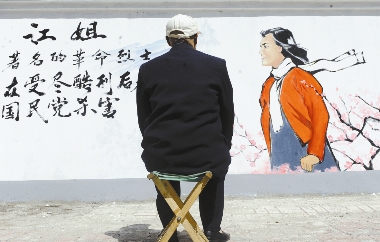


LIU YUN, a 25-year-old school teacher in Beijing, did not reject a “red wash” of Communist preaching, but that was not unconditional.
Liu admitted she goes to the cinema to watch movies depicting the revolutionary era if the films featured movie stars.
“People go to the movies for the stars, and movies with one or two stars are obviously not as popular as those with lots of icons,” Liu said.
“Red” books, however, are not at all interesting, and she found them hard to understand.
As she flipped through a hardcover autobiography of talk show host Yang Lan at the Beijing Book Building in Xidan, she said she preferred success stories of celebrities and corporate executives such as Apple Inc.’s Steve Jobs.
As the 90th anniversary of the Communist Party of China (CPC) approaches, films, TV soap operas and books dedicated to the commemoration are hitting screens and bookshelves.
Bookstores across the country are setting up special shelves for “red” books, or publications about the Communist revolution and socialist construction, but how they can woo young readers who have grown up in the Internet era eating McDonald’s, listening to hip-hop and watching Hollywood blockbusters, remains a challenge.
Liu said her grandparents had told her a lot about the past, but they were traditional. “Just take a look at what’s happening today, China is so integrated with the world,” she said.
In the words of 21-year-old Jiang Lichao, a hotel employee in Beijing, popular culture had become a more acceptable way for young people to get to know the Mao-era stories and revolutionary history.
However, retired professor Zhai expected his 16-year-old grandson to read more “red” books, but this might not be possible if the high school junior could not be exempted from his tight curriculum.
The 80-year-old researcher, who declined to give his full name, was attracted to the “red” book shelves at the Xidan bookstore.
He believes books on history about the Chinese Communists, Mao-era stories and revolutionary figures could have a positive influence on his grandchild.
“Members of the CPC worked so hard to achieve what they have today,” Zhai said. “Their enterprising spirit deserves public promotion.”
But the younger Zhai is too busy with his seven-day curriculum, which consists of five days’ regular classes and extra training sessions at weekends.
The high school student’s only approach to the Mao-era history has been through his grandfather.
He skims through my books sometimes, and I believe he has only a vague idea of the history I’ve told him, the old man said. Young people are too preoccupied with overnight success.
“They seek material wealth, they go after cars, houses and famous brands but are not willing to take a down-to-earth attitude and work,” he said. Reading “red” books could become important because they contained a lot of positive values.
It was necessary for the younger generation to know that their comfortable lifestyles were hard to come by, but parents had to compromise their demands, said Zhu Peiyun, the mother of a 19-year-old son, who was also buying books at the Xidan bookstore.
Zhu has conversations with her child but never imposes values on him. He prefers reading books on time travel.
“My son thinks that history is a bit distant and he will learn what he wants to know through TV programs and the Internet,” she said.
Young people are interested in history, and we need to take a different approach, said Xie Chuntao, a co-author of the bestseller literally translated as “Why the Communist Party of China?”
To make a “red” book popular among the young people, writers need to be frank when addressing topics regarding patriotism, corruption and any other topics that may arouse their interest, said Yan Qiang, a professor at the School of Government at Nanjing University.
Xie’s book, which recounts the 90-year history after the founding of the CPC, sold more than 200,000 copies after it was published in March.
One reason behind the success of “red” books like Xie’s is because he used an objective approach, instead of constant preaching, said the young Zhang Qun, who bought a copy of the book at a bookstore in Nanjing. (Xinhua)
|

